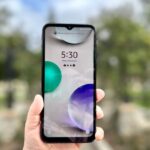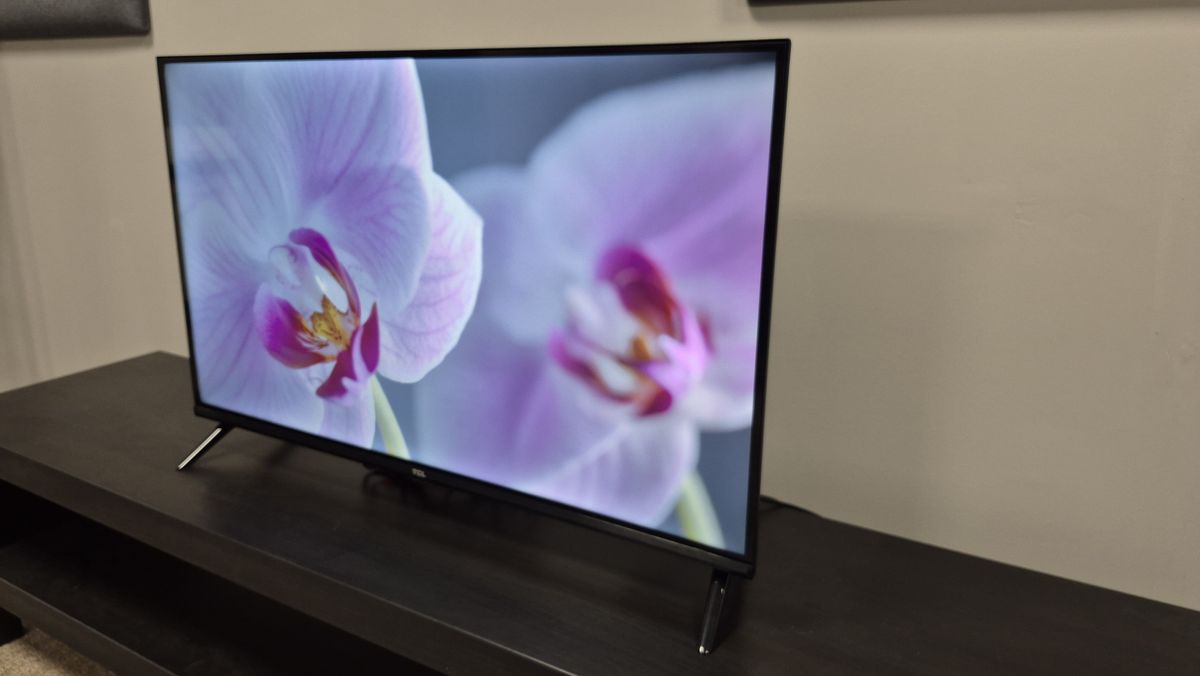The 32-inch TCL S5400 is a temptingly cheap LED TV with an imperfect, yet pleasingly detailed HDR picture. Although carrying a list price of £179 (this isn’t available in the US), and often available for under £150, it’s an enticing budget option.
But before I get into the TCL 32S5400’s picture, value-for-money and all that good stuff, I want to start off by talking about setup here, as I had a somewhat bizarre experience. The TV itself was super-simple to unbox and get plugged in, but after doing this I ran into a problem. This lil’ fella was taking its sweet time to load up smart TV apps, and when navigating through menus, there was some nasty lag. But things got worse. When loading up Star Wars: The Last Jedi on Disney Plus, the application crashed not once, but three times. To my immense relief, though, it seemed that the TV must’ve been updating in the background after initial setup, stunting its capabilities. Did it let me know this? Nope. But on the fourth attempt, suddenly the menus were smoother and I could watch the movie without experiencing sudden blackness.
Is this a huge issue? Perhaps not. I mean this only occurred for the first 50 minutes after initial startup and didn’t bother me again, so this is more of a warning than a reason not to buy. After this, navigation wasn’t bad. Smart TV apps still don’t load super quickly and there can be a bit of lag when sifting through menus, but this is a pretty common issue – even with some of the best 32-inch TVs around. The only other problem was that the screen would flash white before entering into its screensaver, which was a bit jarring.
Otherwise, the smart TV features are straightforward to access and well laid-out. The TCL 32S5400 harnesses the power of Android TV. This will be a familiar interface for many – you get all of the key apps, like Netflix, Prime Video, Disney Plus, Apple TV and more right at the top of the home screen – no need to trawl through cluttered sub-menus.
Anyway, let’s cut to the main event. How does this TV actually look with movies and TV? Well, it’s a pretty mixed bag. Let’s start off with something of a disclaimer. As a cheap 32-inch LED TV, you can’t expect miracles like perfectly true-to-life colour, gorgeous contrast or truly deep blacks. What I was looking for was solid motion, vibrancy and clarity – and the TCL was able to deliver on this to an adequate degree.
Once I (eventually) managed to hop into Disney Plus and fire up Star Wars: The Last Jedi, I instantly loaded up the throne room scene, which contains crimson reds, rapid movements and close-ups on characters’ faces. When watching in Movie mode, I was pleasantly surprised by the reds, which came through in a cutting, bright shade. Sure, they weren’t perfectly accurate and there were slight colour banding issues in moments, but this isn’t the end of the world for a TV often available for under £150.
When taking specific colour gamut measurements, DCI-P3 (the colour space used to master 4K movies and digital cinema releases) was 72.4% and BT.2020 was 52.6%. These are pretty average results for a budget LED TV and some alternatives – like the LG 32LQ6300 (more on this later) – perform considerably better.
Brightness levels were decent, too. When measuring peak brightness on a 10% window test pattern, the results were 223 nits and 217 nits in Standard and Movie mode respectively (in HDR). This is basically equivalent to LG’s TV mentioned above, so is about as good as 32-inch TVs get.
Elsewhere, skin tones and facial details were relatively true-to-life – hair didn’t look blocky, and elements such as sweat droplets were well-defined.
That really captures the strength of the TCL 32S5400. It is, pleasingly, quite good at displaying visual details for a TV in its price-range. For example, when watching The Batman, buttons and stitching on suits, facial particularities were apparent – perhaps not ultra-crisp, but clear.
It did struggle a little bit, however, with the movie’s dark picture – Batman’s suit appeared a little on the grey side, and a lot of black details looked washed. When activating Dynamic Contrast, however, darker tones were a bit more accurate and the grey effect was limited substantially, delivering a better-fitting, darker look for gritty scenes.
During higher-paced sequences, such as the Batmobile chase scene, motion was pretty unimpressive. There was noticeable judder during sharp movements and there wasn’t really a magic solution for this. Subpar motion was also apparent when watching Liverpool vs Crystal Palace highlights on Discovery Plus, although switching into Game or Sport mode resulted in a significant improvement (but turn off Dyanamic Colour in Sport mode, which is on by default, because it looks too garish).
In reality, it’s pretty typical for blacks to look underwhelming on a display like this – it’s no OLED (or even mini-LED), and despite imperfections, they weren’t painstakingly muddy or unclear anyway. What I found to be more disappointing was the tendency for this TV to produce oversaturated colours. When watching La La Land on Blu-ray, the TCL struggled to replicate streetlights, which looked almost fake, even in Movie mode. In a scene where a bunch of people were wearing differently coloured clothing, oversaturation was all too clear with yellows and whites once more.
On top of that, a lot of textures looked a tad artificial, although details – like creases in shirts – looked relatively authentic once again.
Let’s stick with La La Land, because it’s the ideal test subject for our next point of interest – sound quality. So, of course, general TV audio is rarely something to behold, let alone from a 32-inch budget TV. And what I heard sound-wise was certainly in-line with expectations. During the performance of A Lovely Night, the double bass running throughout wasn’t all too audible and percussion got a bit tinny at higher volumes.
Similarly in The Batman, gunshots sounded dulled and lacked the bite audiophiles would listen out for. In fairness, however, sound had decent width and positioning during the Batmobile chase scene and vocals were clear enough too, which is the most important thing.
Volume levels could also climb considerably high despite getting distorted nearer the top end. I would still say, though, that audio is noticeably narrow and a touch muddied, even though this has Dolby Audio and a handful of different sound modes. As a result, it may well be worth snapping up one of the best cheap soundbars to accompany this TV.
One area where this TV actually excels, however, is in the features department, where you get plenty of bang for your buck. As I mentioned before, there are options like Dynamic Contrast which can help add a bit of depth to black details, but there’s more. For instance, in some picture modes you can select Dynamic Colour, something that only emboldened the oversaturation issue I mentioned in La La Land, although it could also lift vibrancy levels in more flat-looking video content.
And yes, there are a lot of picture modes to choose from – though these aren’t created equally. Movie was my go-to in most cases, although Game was quite well-fitting for more fast-paced motion. Options such as Dynamic and Standard, meanwhile, seemed to lean into oversaturation a bit too heavily and produce artificial-looking colours. On top of all of that, you get Google Assistant voice controls for hands-free control – you really do get a fairly comprehensive package for a TV at this cost.
Design-wise this is a solid TV too. It’s kitted out with two HDMI 1.4 ports (one for ARC) – which is totally fine for a 1080p 32-inch LED TV – as well as all the usual suspects: think USB 2.0, digital optical, audio out, headphone ports. The actual build of the TV is nothing to snort at either; you get a tidy bezel-less frame that’s supported by four plastic feet. These aren’t the most compact or premium-looking, but the TV should still appear pleasing enough and fit with ease on a small-medium sized unit.
The TCL 32S5400 proved to be capable for gaming, too. When playing a first-person shooter on the XBox Series X, motion was actually pretty clean with no noticeable lag at any point. You’re not getting 4K resolution or 120Hz/144Hz refresh rates here, so performance will be pretty limited for the newest generation of consoles, but given the TV’s limitations it does well.
Given its ultra-low price, the TCL 32S5400 is a budget option worth considering if you want a secondary TV for your bedroom or spare room. Is it suited to be more than this? Perhaps not. If you need a screen for your family’s living room, for instance, you’d be much better off consulting our guide to the best TVs. However, if you’re a student in a small dorm room and just want access to streaming services or a display for gaming, this would most certainly do the trick. There are, however, a handful of other 32-inch options that could rival this – check out the ‘Also Consider’ section for more.
TCL 32S5400 review: price & release date
- £179 RRP
- Available for under £150
- Launched in 2023
I tested the 2023 version of the TCL 32S5400, the TCL S5400AFK (bit of a mouthful, I know). This specific model is available in the UK, but unfortunately not in the US. Having said that, there’s an extremely similar alternative – both in terms of specs and price – the 32-inch edition of the TCL S350G. However, we haven’t test that model.
Although the TCL S5400 has a list price of £179, it’s often available for considerably less. At the time of writing, you can grab it for as little as £138 at Amazon UK and a handful of competing retailers. That’s a pretty low price for a 32-inch LED TV and makes a lot of its flaws much easier to forgive.
TCL 32S5400 review: specs
| Screen type | LED |
| Refresh rate | 60Hz |
| HDR | HDR10, HLG |
| Audio | Dolby Audio |
| Smart TV | Android TV |
| HDMI ports | 2x HDMI 1.4 |
Should you buy the TCL 32S5400?
| Attributes | Notes | Rating |
|---|---|---|
| Features | Solid picture modes and contrast settings, HDR, voice controls. | 4/5 |
| Picture quality | Nice detail, adequate colour and contrast, blacks/backlight not great. | 3/5 |
| Sound quality | Audio has decent width, but bass is lacking, treble can be a tad grating. | 3/5 |
| Design | Nothing outstanding, but the bezel-free look is tidy. | 3.5/5 |
| Smart TV & menus | Initial problems gave way to a usually smooth and simple experience. | 3.5/5 |
| Gaming | No next-gen gaming features but picture and motion are good overall. | 3/5 |
| Value | Deliciously low price despite inconsistencies picture-wise. | 4/5 |
Buy it if…
Don’t buy it if…
TCL 32S5400 review: also consider
| Row 0 – Cell 0 | TCL S5400 | LG 32LQ6300 | Amazon Fire TV 2-series |
| Price | £179 | $249 / £249 | $199 / £249 |
| Screen type | LED | LED | LED |
| Refresh rate | 60Hz | 50/60Hz | 50/60Hz |
| HDR | HDR10, HLG | HDR10, HLG | HDR10, HLG |
| Smart TV | Android TV | webOS 22 | Fire TV |
| HDMI ports | 2x HDMI 1.4 | 2x HDMI 1.4 | 3 (2x 1.4, 1x for ARC |
TCL 32S5400 review: How I tested
- Tested in our TV testing room in various lighting conditions
- Measurements taken using Portrait Displays’ Calman software
- Tested through a variety of sources, both SDR and HDR
I used a variety of sources to test picture quality on the TCL 32S5400 in both HDR and SDR. This included Disney Plus, YouTube and a collection of Blu-rays played using the Panasonic DP-UB820 4K Blu-ray player. It’s worth noting, though, that I used standard Blu-ray discs to test this TV (rather than a 4K UHD variant). I also played games on the XBox Series X to cover gaming performance.
When watching the TCL 32S5400 I selected video content that would expose the specific strengths and weaknesses of the TV. For instance, I watched The Batman and Star Wars: The Last Jedi predominantly to assess aspects such as colour fidelity, contrast and black-levels. I also watched Top Gun: Maverick and Sky News mainly to judge competence in the sound department – these were ideal picks to test the quality, responsiveness and width of audio output.
Finally, I took appropriate measurements with the help of Portrait Displays’ Calman calibration software. I measured peak brightness on a 10% window and 100% window in both SDR and HDR. I then recorded the Delta-E values (which demonstrates the margin of error between the test pattern and what is displayed) for colour accuracy, grayscale and gamma. I also measured the colour space looking at DCI-P3 and BT.2020 coverage. For all tests, I used the Murideo Six 8K test pattern generator. You can read all about how we test TVs at that link.
- First reviewed: October 2024
- Read more about how we test
Read the full article here














